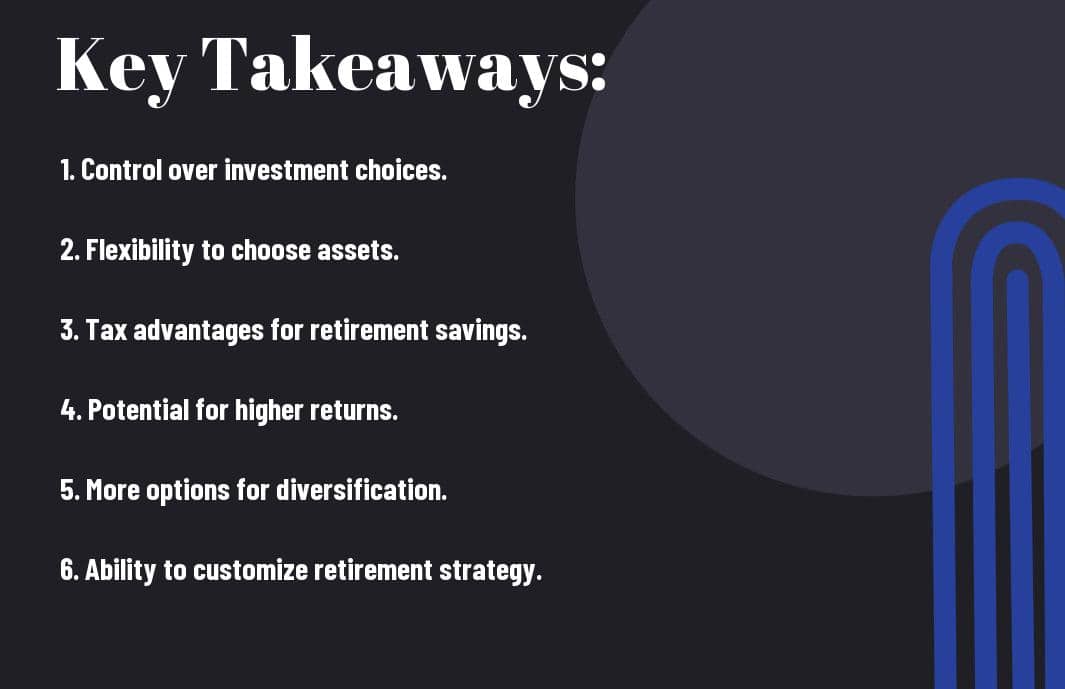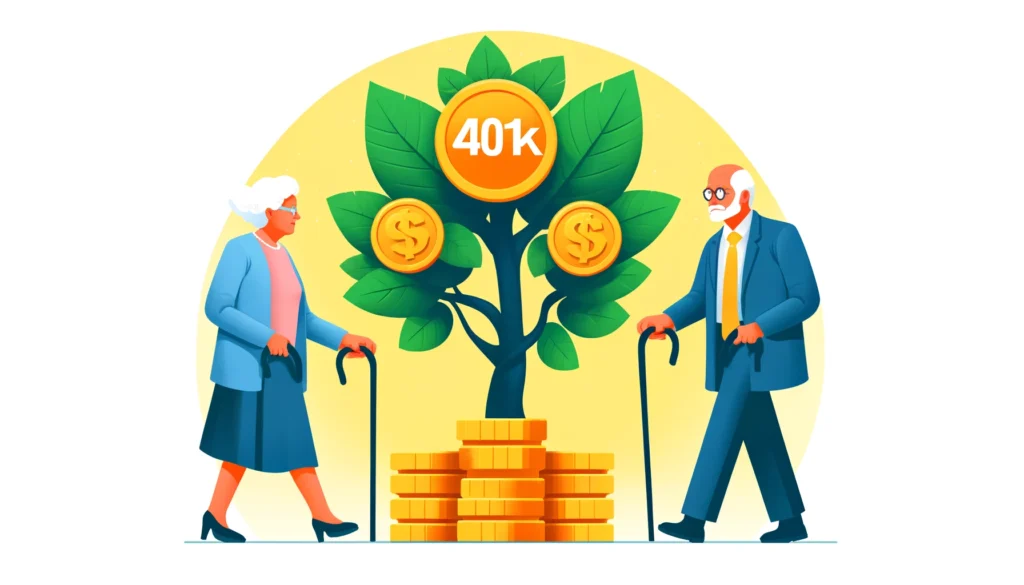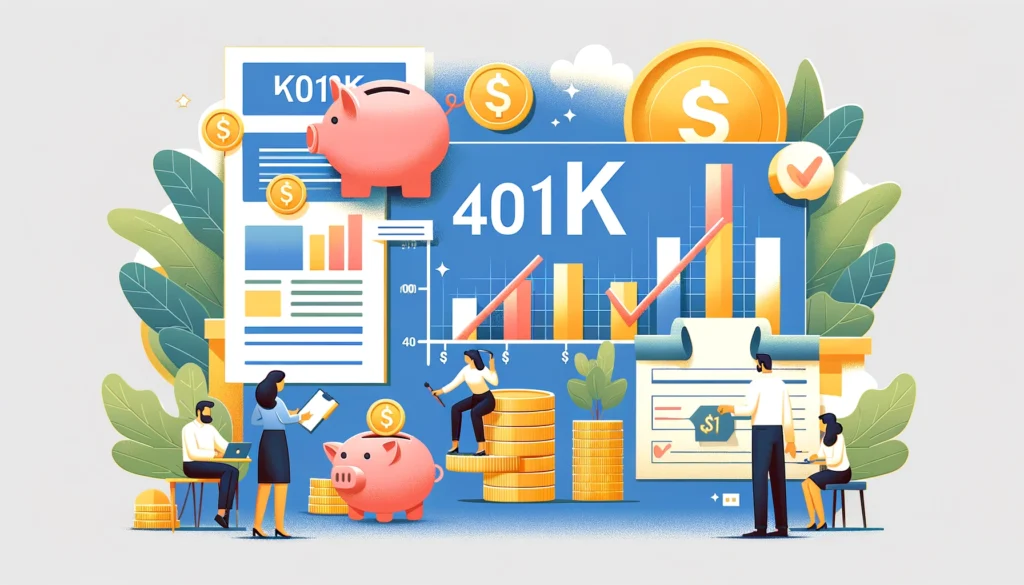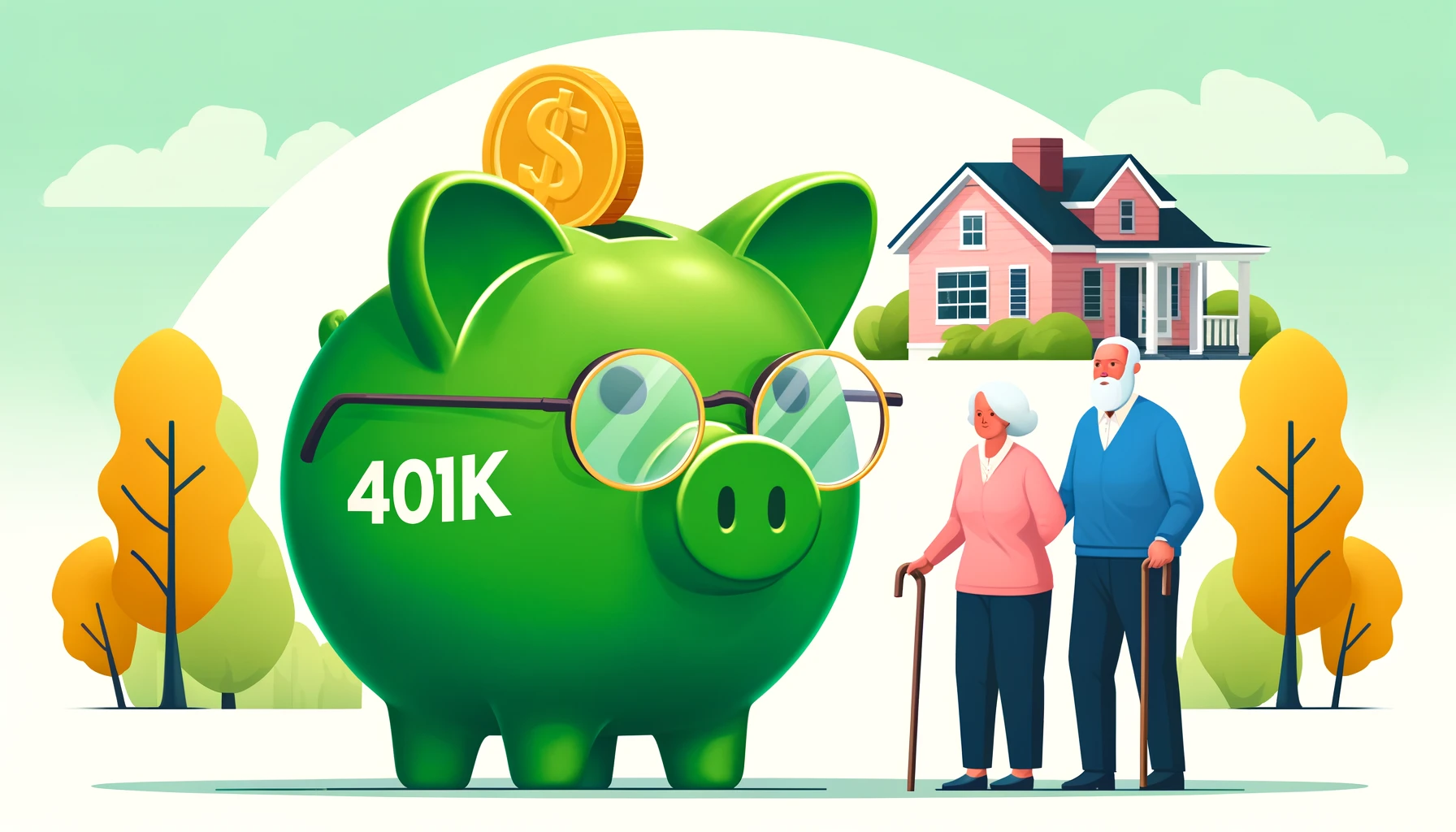Overwhelmed by the complexities of retirement planning? A self-directed 401(k) might be the solution. This retirement plan offers flexibility and control to investors, allowing them to choose from a wide range of investment options beyond traditional stocks and bonds. With the potential for higher returns and the ability to diversify their portfolio, individuals can take charge of their financial future and pave the way for a comfortable retirement. Learn more about the advantages of a self-directed 401(k) in this informational blog post.
Key Takeaways:
- Tax Advantages: A Self-Directed 401(k) retirement plan offers tax benefits similar to traditional 401(k) plans, such as tax-deferred growth on investments and potential tax deductions on contributions.
- Diversification: With a Self-Directed 401(k), you have greater control over your investment choices, allowing you to diversify your portfolio beyond traditional options like stocks and bonds, into alternative investments such as real estate, precious metals, or private equity.
- Flexibility and Control: Having a Self-Directed 401(k) gives you the freedom to tailor your retirement savings strategy to your individual goals and risk tolerance, putting you in the driver’s seat of your financial future.
Flexibility and Control

Investment Options
For individuals who prefer to have control over their retirement investments, a self-directed 401(k) offers a wide range of investment options. Instead of being limited to traditional investment choices like stocks and mutual funds, a self-directed 401(k) allows investors to choose from a variety of alternative investments such as real estate, precious metals, private equity, and more. This flexibility enables individuals to diversify their portfolio beyond what is typically offered in a traditional 401(k) plan.
Checkbook Control
For those seeking even greater flexibility and control over their retirement funds, a self-directed 401(k) with checkbook control is an attractive option. With checkbook control, investors have the ability to write checks or make electronic payments directly from their retirement account to make investments or cover expenses without needing approval from a custodian. This level of control can be beneficial for individuals who want to act quickly on investment opportunities or streamline the process of managing their retirement funds.
Plus, checkbook control eliminates the need to pay transaction fees or seek approval for every investment decision made, giving investors the autonomy to make choices that align with their financial goals and objectives.

Higher Contribution Limits
You can benefit from higher contribution limits with a self-directed 401(k) retirement plan. According to Understanding the Self-Employed 401(k), self-employed individuals have the opportunity to contribute more to their retirement savings compared to traditional employer-sponsored 401(k) plans.
Catch-up Contributions
For those aged 50 and older, catch-up contributions are an attractive feature of a self-directed 401(k) plan. This provision allows older individuals to contribute additional funds to their retirement accounts, enabling them to make up for lost time and boost their savings as they near retirement.
Roth Contributions
Roth contributions offer another valuable option for self-employed individuals. With a self-directed 401(k), you have the flexibility to make Roth contributions, which are funded with after-tax dollars. This means that your withdrawals in retirement, including any investment gains, can be tax-free, providing you with potentially significant tax advantages in the future.
Another benefit of Roth contributions is the ability to diversify your tax exposure in retirement. By contributing to both traditional and Roth accounts within your self-directed 401(k), you can create a tax-efficient strategy that allows you to manage your tax liability in retirement more effectively.
The Benefits of Real Estate Investing in a Self-Directed 401(k) Retirement Plan
Direct Property Investment
Not all retirement plans allow you to invest in real estate directly, but with a self-directed 401(k) plan, you have the opportunity to diversify your portfolio by investing in properties. Direct property investment can offer potential for higher returns compared to traditional investments like stocks and bonds. Additionally, it allows you to have more control over your investment decisions, such as choosing the property type, location, and management.
Real Estate Investment Trusts (REITs)
With Real Estate Investment Trusts (REITs), you can invest in real estate without directly owning the properties. REITs are companies that own, operate, or finance income-generating real estate across a range of sectors. Investing in REITs provides diversification benefits and liquidity as they are traded on major stock exchanges. It offers a more passive way to include real estate in your retirement portfolio.
Real Estate Investment Trusts (REITs) can be a suitable option for investors looking for exposure to the real estate market without the hassle of property management. It allows you to benefit from income potential and capital appreciation that real estate investments can offer, making it a valuable addition to your self-directed 401(k) retirement plan.
Tax Benefits
Despite the many retirement savings options available, a self-directed 401(k) retirement plan stands out due to its significant tax benefits. These tax advantages can help individuals grow their retirement savings more efficiently compared to other retirement plans.
Tax-Deferred Growth
Growth within a self-directed 401(k) plan is tax-deferred, meaning that investment gains, dividends, and interest accumulate without being subject to annual taxes. This tax-deferred growth allows your retirement savings to potentially grow faster since taxes are not deducted each year, compounding your earnings over time.
Tax-Free Withdrawals
For self-directed 401(k) plans, withdrawals made during retirement are typically tax-free, as long as the withdrawals are made after the age of 59 1/2. This means that you can enjoy the fruits of your labor in retirement without having to worry about paying taxes on the money you withdraw. Additionally, if you adhere to the specific guidelines set by the IRS, your beneficiaries can inherit the funds tax-free as well.
With tax-free withdrawals, retirees have the flexibility to access their savings when needed without the burden of dealing with hefty tax implications. This feature provides retirees with peace of mind and financial security during their golden years.

Protection from Lawsuits
All self-directed 401(k) retirement plans offer a level of protection from lawsuits, which is crucial for safeguarding your hard-earned retirement savings.
Asset Protection Strategies
To protect your assets in a self-directed 401(k) retirement plan, it is necessary to diversify your investments across different asset classes. By spreading your funds among various investments, you reduce the risk of losing everything in the event of a lawsuit. Additionally, using legal entities such as LLCs can provide an extra layer of protection for your assets.
Creditor Protection
Creditor protection is a significant benefit of a self-directed 401(k) retirement plan. In the unfortunate event of bankruptcy or legal judgment against you, the assets held within your self-directed 401(k) are typically shielded from creditors. This protection can be crucial for safeguarding your retirement savings from external threats.
Another important aspect of creditor protection is the fact that your self-directed 401(k) retirement plan is considered a separate legal entity. This separation helps to differentiate your retirement assets from your personal assets, providing an additional layer of security against potential creditors.
With creditor protection, you can rest assured knowing that your retirement savings are shielded from external threats, allowing you to confidently plan for your future without the fear of losing everything in the event of a lawsuit or financial crisis.
Inheritance and Estate Planning
To What Is a Self-Directed 401(k)?, one of the significant advantages is the flexibility it offers in terms of inheritance and estate planning. With respect to passing on your retirement savings to heirs, a self-directed 401(k) allows you to designate beneficiaries based on your wishes and potentially bypass the lengthy and costly probate process.
Beneficiary Designations
For beneficiary designations, having a self-directed 401(k) means you have the power to choose who will inherit your retirement funds. This control can be beneficial in ensuring that your assets are distributed according to your wishes, without being subject to the default rules that may apply in traditional 401(k) plans.
Inherited IRAs
With Inherited IRAs, beneficiaries will have the opportunity to continue growing the funds tax-deferred. This provides a valuable opportunity for loved ones to maximize the potential of the inherited retirement savings and create a lasting legacy. However, it’s important to note that if not managed properly, an inherited IRA can also lead to tax consequences and penalties.
Beneficiary designations and management of Inherited IRAs are critical aspects of estate planning that should be carefully considered and updated as needed to ensure your retirement assets are passed on efficiently and effectively.
Final Words
From above, we can see that a self-directed 401(k) retirement plan offers many benefits for individuals looking to have more control over their investments. This type of plan allows for a wider range of investment options, potentially higher returns, and the ability to tailor investments to individual financial goals. Additionally, the flexibility and potential tax advantages of a self-directed 401(k) make it an attractive option for those who want to take a more active role in managing their retirement savings.
FAQ
Q: What is a self-directed 401(k) retirement plan?
A: A self-directed 401(k) retirement plan is a type of retirement account that allows investors to have more control over their investment choices compared to traditional 401(k) plans.
Q: What are the benefits of a self-directed 401(k) retirement plan?
A: A self-directed 401(k) retirement plan offers several benefits, including greater investment flexibility, potential for higher returns, and the ability to invest in alternative assets such as real estate and precious metals.
Q: How does a self-directed 401(k) retirement plan differ from a traditional 401(k) plan?
A: Unlike traditional 401(k) plans, which limit investment options to mutual funds and other traditional assets, self-directed 401(k) plans allow investors to choose from a wider range of investment options, including stocks, bonds, real estate, and more.
Q: Are there any risks associated with a self-directed 401(k) retirement plan?
A: While self-directed 401(k) plans offer greater investment flexibility, they also come with increased risk due to the potential for market volatility and the need for investors to make informed investment decisions.
Q: Who is a self-directed 401(k) retirement plan suitable for?
A: A self-directed 401(k) retirement plan is well-suited for experienced investors who are comfortable with managing their own investments and have a good understanding of the risks involved in alternative asset classes.

